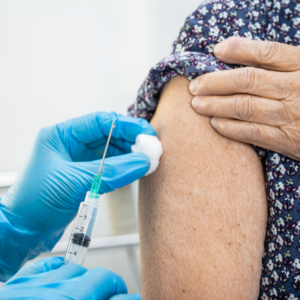One More Shot: Recommendations Regarding The New Covid Booster Vaccine

One More Shot: Recommendations Regarding The New Covid Booster Vaccine
September 14, 2022
Well, despite the lifting of vaccine mandates, mask requirements, and other Covid protections that have been used throughout the pandemic, we are not yet done with Covid-19. Currently, over 450 people per day are still dying of Covid in the United States, and the overwhelming majority of Covid infections (89%) are now due to the Omicron BA.5 variant (and 11% are caused by the BA.4 variant). Up until very recently, no one had received a Covid booster vaccine that specifically targets these 2 variants, thus leaving us more vulnerable to infection, re-infection, or even worse. Now, however, with the recent White House announcement and approval from the CDC and FDA, there is a new booster available in pharmacies and health centers that specifically targets these prominent variants and improves your immunity should you be exposed to them. To find out where you can access this new booster, go to www.vaccines.gov.
While no one knows with 100% certainty what the course of the pandemic will be this fall and winter, it’s assumed that with the cold weather, the move toward more congregation inside, and the lifting of many restrictions, there will be a surge in cases in the coming months. Given that 25% of all eligible people in the US have not been vaccinated (especially younger children), and that many adults eligible for previous rounds of boosters did not take advantage of obtaining them, it’s not clear what the public response will be to this newly tweaked Covid booster. However, anyone 12 and older who received their previous vaccine at least 2 months ago is eligible for this new “bivalent” booster (though many experts suggest waiting 4-6 months after a previous vaccine or infection before getting it). In fact, the previous version of the booster will no longer be available and only people who have never been vaccinated will have access to the original vaccine going forward. Since it takes 1-2 weeks for the full effect of the booster to take hold, experts recommend that each of us access this new booster as soon as possible, especially if you fall into one of the higher risk categories, due to your age, immune-compromised health or other medical problems.
While there is some disagreement among experts about whether this newly tweaked booster is needed at this time, most agree that there is little downside and potentially tremendous benefit. During the Omicron wave from last spring, there was CDC data showing that the risk of death for people over 50 who received 2 boosters (plus their original 2 vaccines) was 3x lower than for those who had only received one booster. In fact, there is even some effort to equate this new booster with the annual rite of passage of getting your yearly flu shot. There are advantages to creating the anticipation in the public that we will now need yearly boosters for Covid the way we do for flu, though we don’t really know if Covid will follow a similar trajectory or whether there will be unanticipated curveballs with newly emerging variants. And there are some experts and policymakers suggesting that this fall you get your Covid booster and flu shot at the same visit. However, it is thought that the wiser course is to get your new Covid booster now but to hold off until at least late October before getting your flu shot. The influenza vaccine apparently loses about 18% of its strength every 28 days, so the earlier you get it the less likely you will have strong protection into the later months of the typical flu season, which could go on through March. So roll up one sleeve now, and prepare for the other sleeve to roll up a bit later this fall.







